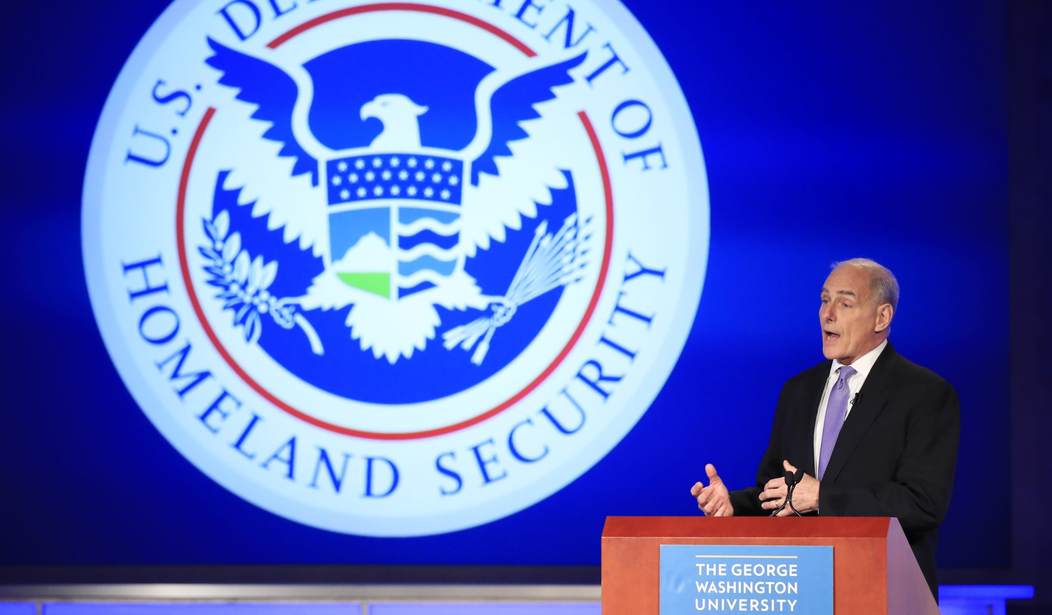WASHINGTON — Homeland Security Secretary John Kelly warned today that Islamic terrorism “is threatening us today in a way that is worse than we experienced 16 years ago on 9/11” because of how terrorists’ operations have “metastasized and decentralized.”
Speaking at George Washington University, Kelly emphasized “we are under attack every single day” and “the threats against us are relentless.”
“We are under attack from criminals who think their greed justifies raping young girls at knifepoint, dealing poison to our youth, or just killing some of us for fun,” he said. “We are under attack from people who hate us, hate our freedoms, hate our laws, hate our values, hate the way we simply live our lives. We are under attack from failed states, cyber-terrorists, vicious smugglers, and sadistic radicals.”
In the years since the Sept. 11, 2001, terrorist attacks, the DHS chief said, “we’ve grown somewhat accustomed” to the terror threat and “now question all the security, all of the issues that we have put in place to secure the nation, because it’s a little bit of an inconvenience at an airport, or a little bit of an inconvenience as you pass onto an airplane.”
“The threat to our nation, our American way of life, has not diminished… As I speak these words, the FBI has opened terrorism investigations in all of our 50 states. And since 2013, there have been 37 ISIS-linked plots to attack our country.”
Kelly noted estimates that as many as 10,000 Europeans fought with ISIS in Iraq and Syria, in addition to thousands more foreign fighters representing the rest of the globe including the Western Hemisphere, and “they have learned how to make IEDs, employ drones to drop ordnance, and acquired experience on the battlefield that, by our reports, they are beginning to increasingly bring home.”
“Many of these holy warriors will survive, come back to their home countries, where they will wreak murderous havoc in Europe, Asia, the Maghreb, the Caribbean and the United States,” he added.
Because many ISIS foreign fighters hail from countries that have a visa waiver agreement with the United States, “they can more easily travel to the United States, which makes us and continues to make us the prime terrorist target.”
But, he said, “few of the challenges we face from a terrorism point of view are even close to as difficult” as homegrown terrorism, which has seen an “unprecedented spike.”
“In the past 12 months alone, there have been 36 homegrown terrorist cases opened in 18 states. These are the cases we know about,” Kelly said. “Homegrown terrorism is notoriously difficult to predict, detect, and certainly almost impossible to control… if you are a terrorist with an innocent internet connection like the one on your ever-present cell phone, you can recruit new soldiers, plan your attacks and upload a video calling for jihad with just a few clicks.”
“And thanks to new and ever-improving and proliferating encryption devices and secure communication techniques, these individuals are becoming harder and harder and, I predict, eventually impossible to detect. Until community leaders, social service providers, teachers, local law enforcement and more aware — are more aware of their options to prevent that message of hate from taking hold, our nation’s youth are prey to these predators.”
During the Q&A, Kelly said he’s ultimately “comforted by what I now know” are the capabilities of DHS, which “is so effective in what it does in terms of intel sharing, taking advantage of databases, as well as producing our own intel.”
“I would tell you that when a person of interest, that is to say someone who’s on a terrorist list, buys a plane ticket in Tokyo and is flying to Abu Dhabi, we know about it,” he said.
Kelly added that “when you hear a report of a family, an individual, whatever, at an airport being put into secondary screening or being refused entry into the United States, believe me, it’s not because of their skin color, it’s not because of the part of the world they come from, it’s not because of their religion.”
“It’s because someone — something, some indicator, some tipper brought the CDP professional there — and they are professionals — brought them to make a decision to put them into additional screening,” he said. “It may have been something they said; their story didn’t work out. It may have been something on their cell phone that brought the attention. There’s always, always, always more to the story.”









Join the conversation as a VIP Member